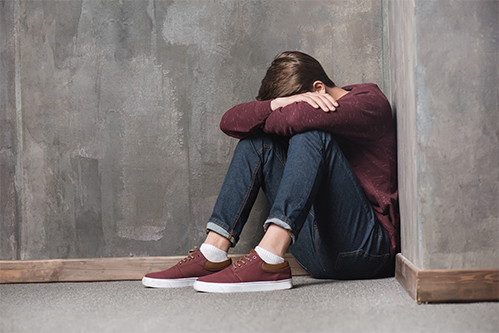
Anxiety & Depression in Teens- Social Media? Digital Technology?
The state of the teen mind and behavior has been addressed from just about every angle- including their mental health. Anxiety, depression and general well-being topics are among them. Social media and digital technology seem to be the culprits.
David Z. Morris, “Experts in teenage mental health say social media is a significant factor in a rising tide of anxiety among teenagers and adolescents.
Some victims are so seized with anxiety they can’t go to school or perform basic tasks – and untold thousands more could grow up unable to cope with the complexities and challenges of everyday life, according to a comprehensive new feature on teen anxiety from the New York Times.
There’s a wealth of hard evidence: Between 1985 and 2016, the number of UCLA freshmen reporting feeling “overwhelmed” surged from 18 percent to 41 percent. Nationally, rates of “overwhelming anxiety” among college students spiked from 50 percent in 2011 to 62 percent in 2016.” (David Z. Morris, Social Media Is Fueling a Scary Trend for Teen Anxiety, Fortune)
Very technical research abstract
Andrew K. Przybylski, Netta Weinstein, “Although the time adolescents spend with digital technologies has sparked widespread concerns that their use might be negatively associated with mental well-being, these potential deleterious influences have not been rigorously studied. Using a preregistered plan for analyzing data collected from a representative sample of English adolescents (n = 120,115), we obtained evidence that the links between digital-screen time and mental well-being are described by quadratic functions. Further, our results showed that these links vary as a function of when digital technologies are used (i.e., weekday vs. weekend), suggesting that a full understanding of the impact of these recreational activities will require examining their functionality among other daily pursuits. Overall, the evidence indicated that moderate use of digital technology is not intrinsically harmful and may be advantageous in a connected world. The findings inform recommendations for limiting adolescents’ technology use and provide a template for conducting rigorous investigations into the relations between digital technology and children’s and adolescents’ health.” (Andrew K. Przybylski, Netta Weinstein, Research Article, A Large-Scale Test of the Goldilocks Hypothesis Quantifying the Relations Between Digital-Screen Use and the Mental Well-Being of Adolescents, in Sage Journals, Psychological Science)
Writing in everyday language:
Author, Jean Twenge seems to have risen as a poster person for this teen/digital tension. About her book, iGen, she says, “Not many research results make you sit up straight in your chair, but this one did. I’ve been tracking trends in the attitudes and behaviors of teens and young adults for many years, primarily relying on a nationally representative survey of U.S. teens conducted every year called Monitoring the Future (MtF) that has surveyed 1.4 million teens since the 1970s. Around 2012 to 2013, there was sudden uptick in teens saying they were experiencing symptoms of depression— feeling hopeless, not enjoying life, believing they can’t do anything right. Depressive symptoms continued to increase over the next few years, making today’s teens — whom I describe in my new book, iGen— significantly more depressed than teens just a few years before.
Then it hit me. In another project, I’d found that teens were spending less time with their friends in person and more time communicating electronically, with these trends accelerating after 2011. That, I realized, was around the time that smartphones became ubiquitous — when many teens (and adults) started spending nearly every waking moment looking at the phones in their hands.
Of course, as I also specifically noted in the Atlantic excerpt, correlation doesn’t prove causation. For example, perhaps unhappy people use screen devices more.
Not only that: No one disputes that in-person social interaction is linked to better mental health. So even if we dismiss the correlation between social media and depression — say, calling it neutral — the decline in in-person social interaction could certainly account for the increase in depression and unhappiness. And why has in-person social interaction declined? Probably because screen time increased.
Given the undeniably negative trends in teens’ mental health and the evidence suggesting smartphone use is at least partially behind them, it makes sense to limit kids’ and teens’ smartphone use. As with any intervention, the risks of doing something versus doing nothing must be considered. There doesn’t seem to be much risk involved in limiting smartphone use to 90 minutes a day or less. However, doing nothing and having teens continue to spend six-plus hours a day with new media risks having these negative mental health trends continue.
I would applaud a large, randomized controlled trial that directly addresses the causal link between smartphones and depression.
Right now, smartphone use is the most likely change agent, so it’s the one I’m addressing with my own children, and the one I think other parents should consider. Teens and young adults are telling college counselors, survey administrators, and therapists that they are suffering, and we need to listen.”
(Jean M Twenge Ph.D., Why So Many of Today’s Teens Are Depressed the answer may be right there in their hands: the smartphone, Psychology Today)
While Dr. Twenge’s book is not definitive- nor was that its intention, it brings attention to a growing concern.
Morris offers advice, “At least some experts told the Times that the solution to anxiety is to stop treating adolescents like babies – to insist that they face challenges and handle everyday tasks themselves, rather than coddling them. That ethos has been formalized in what’s known as “exposure therapy” exercises that force anxious teens to push their boundaries, and which have proven effective.
But therapy can be costly, and few parents have access to residential treatment programs like the one at the heart of the Times story.”
Therapy- This is where Counseling on Demand comes in- not residential, not expensive.
We are online at www.CounselingonDemand.com
Effective Online Counseling…Only a Click Away